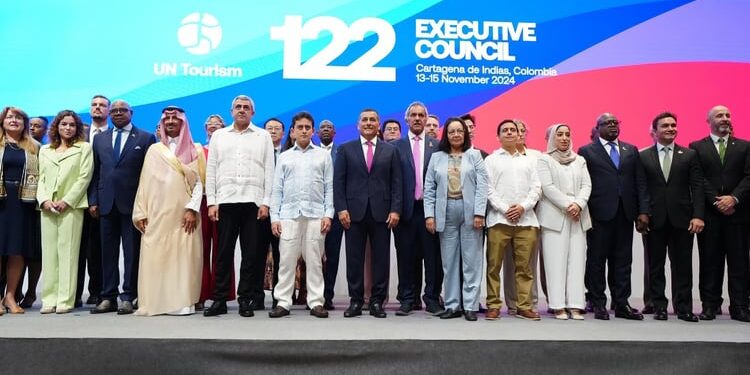The Diplomat
UN Tourism reaffirmed its commitment to the sustainable expansion of the tourism sector during the 122nd session of its Executive Council, held in Cartagena de Indias (Colombia) on November 13-14.
In a context in which the industry is at 96% of its pre-pandemic levels, the Executive Council of the United Nations agency for tourism once again stressed that this is a crucial moment for the transformation of global tourism, highlighting the resilience of the sector and its impact not only on the world economy but also in the regions, where tourism is a driver of development at the local level.
With the participation of representatives from 47 countries, including 21 vice ministers, 350 international delegates, representatives of the private sector, members of civil society and financial partners, the Council focused on two strategic axes: innovation and attracting investment for its development.
Cartagena was not only a platform for the exchange of ideas, but also a working space where public and private sector representatives explored strategies to consolidate sustainable tourism and inclusive growth. The conclusions and alliances generated in this Executive Council seek to lay the foundations for a tourism that responds to the demands of a global economy, but that is also aligned with the UN Sustainable Development Goals.
The Secretary General of UN Tourism, Zurab Pololikashvili, highlighted Colombia’s role as host country, praising its commitment to the tourism sector and the vision of its government in its commitment to the organization of international summits for the sector. Along these lines, Colombia is once again consolidating its position as a benchmark for cooperation and leadership in tourism.
“Colombia has chosen to invest in tourism, not in arms or war, and as the only country to have hosted all the major UN Tourism events of the year, including two General Assemblies, it represents a clear testimony to the power of tourism as a force for change,” said Pololikashvili.
The secretary general also presented a report on progress in investment, education and innovation since the last Executive Council. Throughout the session, progress was made in designing plans for a more inclusive, resilient and forward-looking sector, focusing on:
- Innovation: UN Tourism is leading innovation in the tourism sector by organizing competitions and events aimed at transforming the different areas of the sector. The winners of the “Green Projects Challenge and the Community Tourism Challenge” were also announced during the Council.
- Investment: UN Tourism presented its guidelines for doing business in the tourism sector: Investing in Colombia. The series already has 17 editions published, although more will be released in the coming months.
- Education: Updates on the promotion of tourism education were also presented during the Council meeting, including the Education Toolkit for Secondary Schools, the UN Online Academy and the Global Network of International Academies.
Strengthening strategic partnerships
Within the framework of the 122nd Executive Council, UN Tourism paid special attention to building and strengthening a network of strong partnerships around shared objectives. To this end, a special networking session was held for UN Affiliate Members. This session focused on the tourism dynamics of the future with the aim of advancing policies aligned with the Sustainable Development Goals.
Announcement of the Best Tourism Villages 2024
During the Council session, the latest additions to the Best Tourism Villages network for the 2024 edition were announced. An additional number of rural destinations were awarded the title in recognition of their efforts in creating opportunities for local populations and preserving natural and cultural heritage. In this fourth edition, 55 towns from all regions received recognition, chosen from more than 260 applications from over 60 UN Tourism Member States. Another 20 sites were selected to join the program.
The Best Tourism Villages initiative is part of the UN Rural Development Program, designed to foster development and inclusion in rural areas, prevent depopulation, and advance innovation and integration in the value chain through tourism, “always promoting sustainable practices.”
“Tourism is a vital tool for inclusion, empowering rural communities to protect and value their rich cultural heritage while driving sustainable development,” stated Pololikashvili.
Innovation and investment
Top public and private sector leaders gathered in Cartagena to drive investment and innovation in global tourism at the Global Forum on Investment and Innovation, broadly supported by a number of Colombian organizations.
The Forum underscored the need to increase investment and innovation in the tourism sector, focusing on public-private partnerships. To this end, it was attended by representatives from Bahrain, Colombia, Dominican Republic, Saudi Arabia and Zambia, as well as various private sector players.
Colombia, a leading tourism investment destination, attracted US$1 billion in projects between 2018 and 2023, generating more than 4,700 direct jobs. In this context, UN Tourism presented updated investment guidelines for Colombia and launched its Tourism Investment Report 2024 in collaboration with the Financial Times.
During the Forum, the finalists of the Green Project Innovation Challenge were also announced, highlighting young talent from Latin America and the Caribbean. In the panel on innovation and leadership, speakers emphasized the importance of fostering young talent through education and networking.







